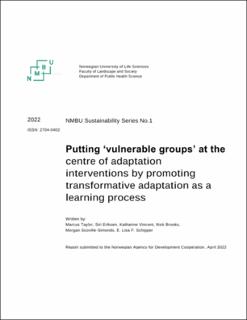| dc.contributor.author | Taylor, Marcus | |
| dc.contributor.author | Eriksen, Siri | |
| dc.contributor.author | Vincent, Katharine | |
| dc.contributor.author | Brooks, Nick | |
| dc.contributor.author | Scoville-Simonds, Morgan | |
| dc.contributor.author | Schipper, Lisa | |
| dc.date.accessioned | 2022-10-31T12:36:20Z | |
| dc.date.available | 2022-10-31T12:36:20Z | |
| dc.date.issued | 2022 | |
| dc.identifier.issn | 2704-0402 | |
| dc.identifier.uri | https://hdl.handle.net/11250/3029131 | |
| dc.description | Report submitted to the Norwegian Agency for Development Cooperation (Norad) | en_US |
| dc.description.abstract | This report is a follow up and deepening of the working paper, “Climate change interventions and vulnerability reduction in developing countries: Challenges and leverage points for transformation”. In that backgrounder, we highlighted that many adaptation interventions inadvertently reinforce, redistribute or create new sources of vulnerability (Eriksen et al. 2021a), which is also reflected in the concept of ‘maladaptation’ that was recently foregrounded in the recent IPCC AR6 WGII Report (IPCC 2022).
Maladaptation frequently stems from overly technical adaptation programming that is top-down and driven by outside objectives and knowledge. Instead, there is increasing recognition of adaptation as a socio-political process that addresses the root causes of the vulnerability of communities or segments of the population and, in so doing, builds the capacities of impacted populations and communities to engage climate challenges. This approach is termed ‘transformative adaptation’ and requires engagement with governance and institutional questions about whose values and perspectives are embraced within adaptation planning, and considering justice in these processes.
This background paper highlights the kinds of practice that can help avoid maladaptive outcomes and promote transformative adaptation. Through case study examples of projects that - at least partially - embody aspects of a reflexive approach, the paper identifies ‘checklists’ of positive features to encourage and ‘red flags’ to be questioned or avoided in project proposal evaluation. | en_US |
| dc.description.sponsorship | NORAD | en_US |
| dc.language.iso | eng | en_US |
| dc.publisher | Norwegian University of Life Sciences, Ås | en_US |
| dc.rights | Attribution-NonCommercial-NoDerivatives 4.0 Internasjonal | * |
| dc.rights.uri | http://creativecommons.org/licenses/by-nc-nd/4.0/deed.no | * |
| dc.subject | Climate change adaptation | en_US |
| dc.subject | Maladaptation | en_US |
| dc.subject | Transformation | en_US |
| dc.subject | Coproduction of knowledge | en_US |
| dc.title | Putting 'vulnerable groups' at the centre of adaptation interventions by promoting transformative adaptation as a learning process | en_US |
| dc.type | Report | en_US |

